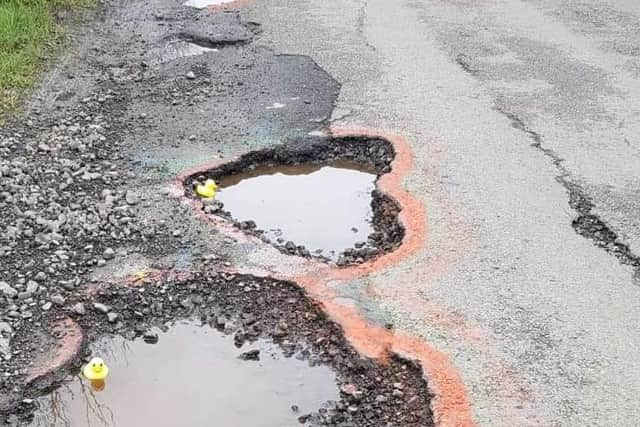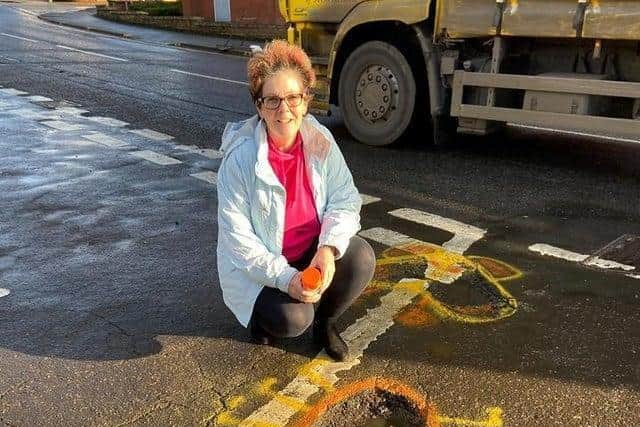'Potholes are driving me quackers' - 'Bugsy' strikes again filling them with rubber ducks
and live on Freeview channel 276
Ones on the road through the old aerodrome at Firsby are so deep that not only has Karen Chapman been painting them into bugs, she has floated rubber ducks in them.
"Yes, you could say the pothole problem has finally driven me quackers," said Karen, of Holton Holgate, who the Standard first introduced as 'Bugsy the Pothole Picasso' in January last year after she took a paint tin to a 13cm deep pothole that burst her tyre and left her with a hefty garage bill.
Advertisement
Advertisement
Since then she has painted hundreds of bugs around potholes and doesn't see when she might be slowing up.


"I've have painted about 30 potholes in the last month," she said. "I just thought it might get people talking and reporting potholes by putting ducks in them.
"I have to be careful where I put the ducks because of kids running into the road or all the Spilsby area potholes would have ducks.
"I'm thinking of plant some up and making them into a garden!"
Advertisement
Advertisement
Figures from Lincolnshire County Council indicate it would take around £400m to repair every single road and pavement.


And the shortfall would have even bigger if the county council had not pumped £12.3m of its own money into roads maintenance..
The authority’s initial roads budget for 2021/22 was £38.7m, compared to £51m in 20/21 – a reduction of almost a quarter (£12.3m) year on year.
However, the county’s budget includes an additional £12.3m to make up the deficit.
Advertisement
Advertisement
The extra money will come from savings in other areas and reserves.
Despite the on-going funding issues – caused by central Government cuts – the council says it is ‘much better’ at fixing defects.
The figures reveal:
• The council repaired 2,480 potholes across Lincolnshire in January;
• In the week February 22 to March more than 1,500 potholes were fixed;
Advertisement
Advertisement
• As of now, there are around 3,000 reported potholes waiting to be repaired;
• 70 per cent have repairs scheduled
That ‘waiting list’ follows one of the coldest winters for many years.
However, the Standard understands that after the last bad winter (2018), the council had over 20,000 potholes waiting to be fixed.
Before the council’s budget plans were confirmed, Coun Richard Davies, executive member for highways: “For such a vitally important service to be cut so drastically is frustrating and disappointing.
Advertisement
Advertisement
“We must receive more reports, requests and comments about our roads, than about any other county council service.
“Prevention is always better than the cure, and without adequate funding, there will be long-term consequences for the state of our roads,and huge investment needed to bring them back up to standard.”
The county also points to an imbalance nationally.
In 2019/20, the county was able to invest around £25,000 per mile in its road network while London councils were able to afford an average of £62,000 per mile.
Regarding the decision to make up the funding shortfall, council leader Coun Martin Hill said: “The taxpayers of Lincolnshire should not be expected to cover indefinitely money which should go to road repairs that the Government holds from fuel duty.
Advertisement
Advertisement
“Continuing to invest in Lincolnshire’s infrastructure would have been an ideal way to continue the Government’s agenda of ‘levelling up’ the county.
“But a roads funding reduction of nearly 25 per cent seems completely counterproductive .”
Read more